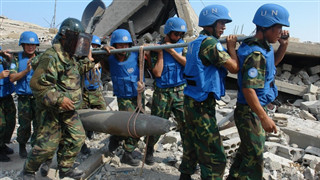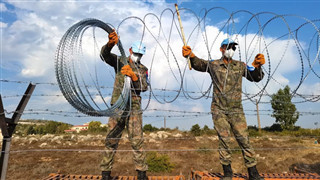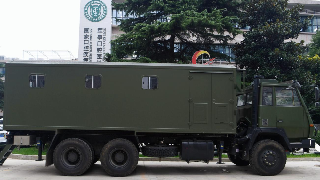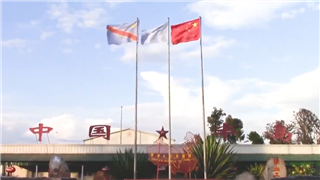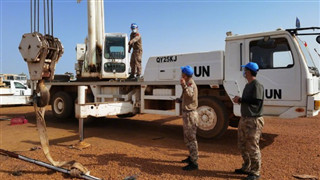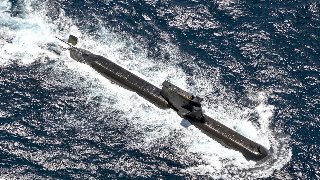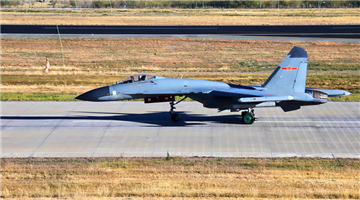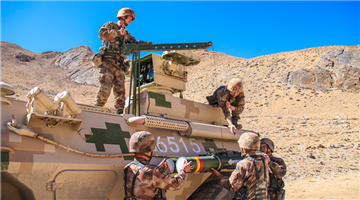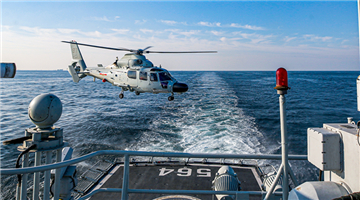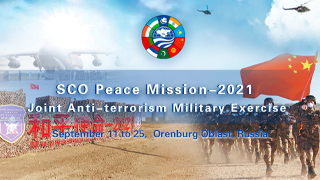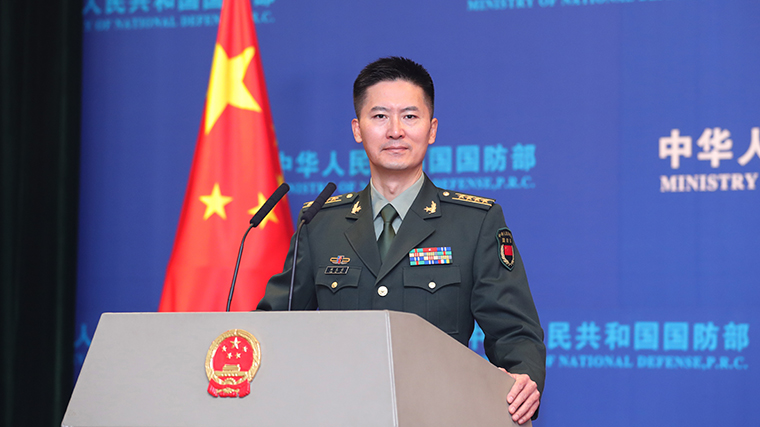
Senior Colonel Tan Kefei, spokesperson for the Ministry of National Defense (MND) of the People's Republic of China (PRC), answers reporters' questions at a regular press conference on October 28, 2021. (Photo: mod.gov.cn)
(The following English text of the press conference is for reference. In case of any divergence of interpretation, the Chinese text shall prevail.)
First of all, I would like to announce a piece of news.
The PLA Army Engineering University will host the 8th International Army Cadets Week (IACW) in Nanjing from November 9 to 11. Under the theme of “Capabilities of Army Officers in Joint Operations and Their Cultivation”, this year’s IACW will be held both online and offline and will include keynote speeches, guest forums, seminars, tabletop exercise of simulated UN peacekeeping operations, and introduction to traditional Chinese culture. Cadets from army academies in countries including the US, Britain, Japan, Pakistan, Australia, Brazil and South Africa will be invited to participate online, while cadets from twelve PLA Army academies will come to the main venue in Nanjing. This event aims to provide an international exchange platform for young army officers and cadets around the world and promote mutual understanding and learning.

Question: President Xi Jinping attended a commemorative meeting marking the 50th anniversary of the restoration of the People’s Republic of China’s lawful seat in the United Nations (UN) and delivered an important speech on October 25. China has been praised by the UN as a key force in UN peacekeeping operations (UNPKOs) for its active participation. Please tell us more about the Chinese military’s contribution to international peacekeeping.
Answer: At the commemorative meeting marking the 50th anniversary of the restoration of the People’s Republic of China’s lawful seat in the UN, President Xi Jinping said that the past five decades hadwitnessed China’s peaceful development and its commitment and dedication to the welfare of all humanity. In the past 50 years, the Chinese people have upheld the authority and sanctity of the UN and practiced multilateralism, and the cooperation between China and the UN has deepened steadily. China has faithfully fulfilled its responsibility and mission as a permanent member of the UN Security Council (UNSC), stayed true to the purposes and principles of the UN Charter, and upheld the central role of the UN in international affairs.
China takes an active part in UNPKOs. It is the largest troop-contributing country and the second largest financial contributor to peacekeeping operations among the permanent members of the UNSC. In the past 30-odd years, the Chinese military has sent around 50,000 peacekeepers to participate in 25 UNPKOs. The Chinese Blue Helmets have defied difficulties and dangers and earnestly fulfilled their duties. In the mission areas, they have made great efforts to supervise ceasefires, protect civilians, stabilize local situations, save lives, and spread the seeds of hope. Their positive contributions to promoting the peaceful resolution of disputes, maintaining security and stability, and accelerating economic and social development in relevant countries have been highly commended by various parties.
In the new era, the Chinese military has comprehensively implemented the pledges announced by President Xi Jinping at the UN Peacekeeping Summit. We have built an 8,000-strong standby peacekeeping force and strengthened support for UNPKOs. Currently, more than 2,200 Chinese peacekeepers are deployed in the UN Headquarters and seven mission areas, namely South Sudan, the Democratic Republic of the Congo (DRC), Mali, Lebanon, Abyei, Western Sahara and the UN Truce Supervision Organization (UNTSO). This year, the Chinese military organized the “Shared Destiny-2021” UN peacekeeping field training exercise and the “Shared Mission-2021” command post exercise. We held a series of online activities including experience-sharing meetings, a reception on the International Day of UN Peacekeepers, and a peacekeeping exhibition. We also released some promotional videos on peacekeeping. These events demonstrate China’s firm resolve to safeguard the UN-centered international system.
As President Xi quoted, “Green hills immerse in the same cloud and rain. The same moon lights up towns however far away”. No matter how the international landscape evolves, the Chinese military will stay committed to the vision of building a community with a shared future for mankind, abide by the basic principles of the UN Charter and peacekeeping operations, and honor its solemn pledge of safeguarding peace. We will actively respond to the UN’s Action for Peacekeeping (A4P) initiative, continue to support and participate in UNPKOs and make new contributions to the UN peacekeeping cause.
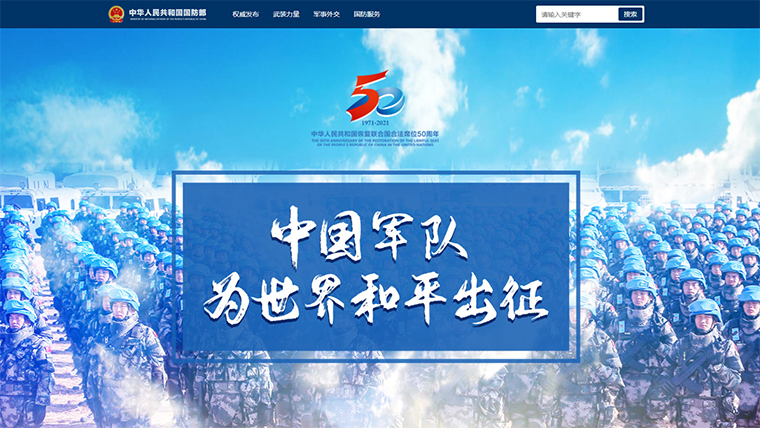
Question: It is reported that the leader of the Democratic Progressive Party (DPP) gave a so-called speech on October 10, claiming that the two sides across the Taiwan Strait “should not be subordinate to each other” and that Taiwan will continue to beef up its military strength, showcase its resolve of defense, and go all out to stop any unilateral change of the status quo. Do you have any comment on that?
Answer: President Xi recently delivered an important speech at the commemorative meeting marking the 110th anniversary of the Revolution of 1911. He reiterated China’s commitment to the one-China principle and the 1992 Consensus, denounced the “Taiwan independence” separatist activities, and reaffirmed China’s firm resolve and will to defend national sovereignty and territorial integrity. He also pointed out that China’s reunification and national rejuvenation is a historical trend and charted the future direction of the cross-strait relations.
Essentially a force seeking “Taiwan independence,” the DPP authorities have been instigating hostility and clamoring confrontation in disregard of the interests of the Chinese nation and the welfare of people in Taiwan. They are trying to hijack the public opinions in Taiwan in the name of a so-called consensus and colluding with overseas forces to pursue “independence”. Their despicable act of forgetting their heritage, betraying their motherland, and splitting the country once again proves that secessionist activities aimed at “Taiwan independence” are the greatest obstacle to China’s national reunification and a grave danger to national rejuvenation.
The Chinese nation has an honorable tradition of opposing separatism and safeguarding unity. Resolving the Taiwan question and realizing complete national reunification concerns the fundamental interests of the Chinese nation and is an inevitable requirement for achieving national rejuvenation. It is the sacred mission of the PLA to resolutely defend national sovereignty and territorial integrity, and thwart the interference of external forces and the secessionist actions for “Taiwan independence”. National reunification is the trend of history and the right cause. When the PLA defends, it is immovable like a mountain. When it strikes, it will fall like a thunderbolt. Bearing firmly in mind its missions and duties, the PLA will stay highly alert and always be ready to fight and win whenever needed by the Party and the people.
Question:State Councilor and Defense Minister General Wei Fenghe recently had a video call with Argentina’s Defense Minister . Please brief us on the call and comment on the mil-to-mil relations between China and Latin American countries in recent years.
Answer: General Wei Fenghe, State Councilor and Defense Minister of China, had a video conference with Argentine Defense Minister Jorge Taiana on October 21. They exchanged views on relations between the two countries and the two militaries, and other issues of mutual interests. Minister Wei said China and Argentina are trustworthy friends and partners. He said the Chinese military is willing to make joint efforts with the Argentine military to expand cooperation in high-level exchanges, personnel training, military health, and international peacekeeping, so as to push the relationship between the two militaries to a new level.
In recent years, the Chinese military has carried out fruitful cooperation with counterparts from Latin American countries in areas such as mutual visits, professional exchanges, personnel training, equipment and technology, and joint exercise and training.
First, the Chinese military has maintained high-level communication with defense leaders in Latin America. Since the outbreak of the pandemic, Minister Wei Fenghe has kept strategic communication with the defense leaders of multiple Latin American countries, including Argentina, Bolivia, Cuba, Peru, Republic of Trinidad and Tobago, and Venezuela via video link or letters. These communications help China and Latin American countries deepen mutual trust and friendship.
Second, we have cooperated in fighting the pandemic and build a China-Latin America community with a shared future. After COVID-19 first broke out in China last year, the Republic of Trinidad and Tobago was the first foreign country to provide medical supplies to the Chinese military. When the pandemic later spread to the whole world, the Chinese military also provided vaccines and medical supplies to the militaries of various Latin American countries, including Argentina, Cuba, Peru, and the Republic of Trinidad and Tobago. China and Latin American countries are working together to build a China-Latin America community with a shared future.
Third, we have made positive progress in building multilateral platforms for China-Latin America military exchanges. In recent years, the Chinese military has established exchange platforms and mechanisms with the militaries of Latin American countries on multiple levels and through such channels as the China-Latin America Defense Forum, seminar for senior Latin American military officers, and the seminar on humanitarian assistance and disaster relief. In late July this year, the first China-Latin America peacekeeping video webinar was successfully held. More than 50 peacekeeping officials and experts from China and ten Latin American countries attended the webinar, marking a new achievement in building multilateral platforms for military exchanges between the two sides in time of the pandemic.
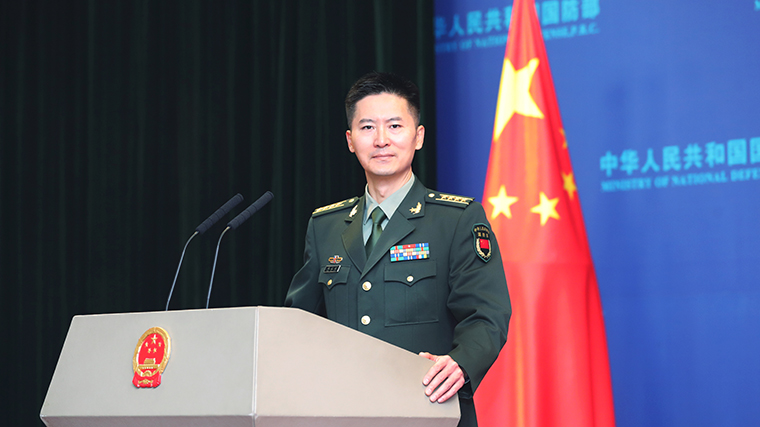
Question: At the end of September, officials from Chinese and American defense authorities co-hosted the 16th Defense Policy Coordination Talks (DPCT) via video. The two sides had an in-depth exchange of views on the relations between the two countries and the two militaries, and on issues of mutual interest. According to news released on the website of the US Department of Defense, the meeting is an important component of the Biden Administration’s ongoing effort to maintain open communication channels with China and responsibly manage the competition between the US and China. Please comment on the current relationship between the two militaries.
Answer: The China-US military-to-military relationship is an important part of the state-to-state relations. China’s attitude toward developing the mil-to-mil relationship with the US has been consistent, clear, positive and sincere. At the end of September, a leader of the Office for International Military Cooperation of China’s Central Military Commission (CMC) and a deputy assistant secretary of defense of the US Department of Defense co-chaired the 16th China-US DPCT via video, which was the first institutional dialogue between the two militaries after the new US administration came into office.
The two sides had pragmatic and in-depth discussions on the mil-to-mil relationship and other issues of mutual interest, and achieved some important outcomes. First, the two sides exchanged views on their current defense relations and the future arrangements for military exchanges. They agreed that maintaining a stable relationship between the two militaries serves the interests of both sides. Second, the two sides had constructive discussions on strengthening crisis management, confidence building and cooperation between the two militaries. Third, the two sides exchanged views on policy issues affecting the mil-to-mil relationship. The Chinese side reiterated its major concerns on relevant issues and reaffirmed its commitment to safeguarding national sovereignty, security and development interests.
China and the US are two major countries of great influence in the world. The Chinese side believes that maintaining strategic communication and strengthening exchange and cooperation between the two militaries is beneficial to the two sides and in line with the general expectations of the international community. China-US relationship has gone through a journey of ups and downs in the past 40-odd years since the establishment of diplomatic ties. The past has proved that dialogue and cooperation lead to a brighter future while conflict and confrontation a dead end. Justice and reason must be upheld in handling the relationship. With all the difficulties and challenges in today’s world, we hope the US side can have a correct perception of China, adopt a rational and practical China policy, work with China in the same direction, and take concrete actions to promote a stable and sound mil-to-mil relationship. On that basis, the two sides can jointly answer the “question of the century”, which is, how to develop the China-US relations in the new era.
Question: Recently, China and Russia held the Joint Sea-2021 military exercise and conducted a joint maritime patrol for the first time. The two events have captured extensive attention in the world. Could you please introduce the highlights and outcomes of the events?
Answer: From October 14 to 23, the Chinese and Russian navies successfully held the Joint Sea-2021 military exercise and the first joint maritime patrol. The two activities further improved the two navies’ capabilities of jointly dealing with maritime security threats and preserving regional peace and stability, and added new connotations to the relations between the two countries and the two militaries. The activities are in the annual China-Russia military cooperation plan and are not targeted at any third party.
There are four points I want to mention for the joint exercise and the first joint maritime patrol. First, we made breakthroughs in the equipment used and in force operations. For the Chinese side, multiple platforms including the 10,000-ton class Type 055 destroyer and Y-8 anti-submarine patrol aircraft participated in the exercise for the first time. The Russian side sent large anti-submarine vessels and new type frigates. The participating forces conducted sea drills in the mission area under complex meteorological conditions and operated jointly. Second, directing for unplanned scenario was emphasized in organizing and commanding. Commanding officers from the two sides have strengthened interoperability through the exercise. Third, the training subjects were designed to be closer to actual combat and more confrontational. Fourth, the joint exercise and the joint patrol were carried out in close succession. After the joint exercise, naval ships of the two sides continued to carry out a joint patrol in the Sea of Japan, the West Pacific, and the East China Sea. It was the first joint maritime patrol between Chinese and Russian navies.
Unity creates strength, and true friendship lasts. This year marks the 20th anniversary of the signing of the China-Russia Treaty of Good-Neighborliness and Friendly Cooperation. China stands ready to work with the Russian side to consolidate bilateral friendship for generations to come, implement the important consensus reached by the two heads of state, and deepen the relationship between the two militaries. The Chinese side will strengthen strategic coordination and practical cooperation with the Russian side in all areas and on different levels to make greater contributions to the China-Russia comprehensive strategic partnership of coordination for the new era and safeguarding international and regional strategic stability.
Question: The COVID-19 pandemic is still spreading across the world with new outbreaks in many countries. Could you please brief us on the efforts of the Chinese military in international anti-pandemic cooperation?
Answer: Since the COVID-19 broke out, the Chinese military, while conducting rigorous pandemic prevention and control itself, has actively planned and participated in international cooperation in battling against the pandemic, taking concrete actions to fulfill its international responsibilities as the military of a major country and implement the vision of building a community with a shared future for mankind.
Since last year, leaders of the Central Military Commission have held talks or exchanged letters with the defense and military leaders of many countries to discuss pandemic prevention and control. The Chinese military has had anti-pandemic cooperation with the militaries of more than 50 countries by providing medical supplies, sending military medical expert teams, and holding video conferences to exchange experience in pandemic prevention and control.
Since February this year, as part of its efforts to implement President Xi Jinping's important pledge of making China's COVID-19 vaccine a global public good, the Chinese military has provided 36 batches of vaccine assistance to the militaries of 28 countries, including Pakistan, Cambodia, Laos and Vietnam.
The history of human civilization is also the history of man fighting and defeating plagues. Upholding the vision of building a community with a shared future for mankind, the Chinese military will stand side by side with its foreign counterparts through the hard times and keep deepening and broadening international anti-pandemic cooperation, so as to make new and greater contributions to building a global community of health for all.
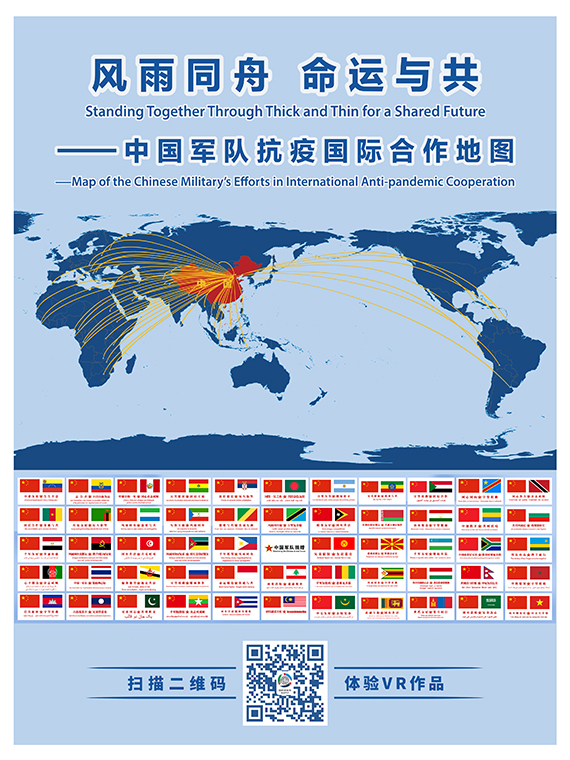
Question: It is reported that the Chinese military held a workshop for political education innovation in Beijing from October 11 to 12. Please brief us on the PLA's efforts in building a political education system in the new era.
Answer: This year, the military has been studying and implementing a series of important instructions and requirements of President Xi on strengthening and improving political education. Following the spirit of the military’s political education work conference, we organized a workshop on innovative political education which focused on improving the quality and efficiency of inculcation teaching. Solid progress has been made in building a political education system in the new era in the campaign of studying Party history. There are four main characteristics:
Firstly, taking Xi Jinping Thought on Strengthening the Military as the mainstay of teaching, the military has given full play to the role of classroom education as the main channel and made good use of the textbooks for political education in the new era to promote Xi Jinping Thought on Strengthening the Military among its rank and file. Secondly, we have underlined the political responsibility of leading officials in setting examples and taken measures to improve their studying and teaching styles so that they can educate soldiers with dedication . Thirdly, we have pushed forward the transformation of teaching. We will increase the accuracy of inculcation teaching, generate new driving forces for self-education, make use of information technology and network, and cultivate soldiers with the culture of building a strong military. Fourthly, we have strengthened the supervision system to strengthen the quality and efficiency of political education. We will improve the system of supervision by the Party committees, pioneer the path of regional coordination in political education, strengthen the training of political teachers, and enhance the binding force of supervision to build a pattern of political education with the Party committees exercising overall planning and supervision.
Question: It is reported that the result of the selection of the first National Textbook Development Award was announced a few days ago. 38 projects recommended by the military won awards. The award-winning textbooks are all urgently needed by the troops for improving combat readiness. Please introduce the development of military training textbooks of the Chinese military.
Answer: The military training textbooks constitute an important base and support of military training and talent cultivation. Since the start of the selection of the first National Textbook Development Award, the military have attached great importance and followed the procedure to organize selection, evaluation and application from bottom to top. Six military-recommended textbooks won the first prize of excellent textbooks and 26 won the second prize. Two military units won the Advanced Groups Award and four military personnel won the Advanced Individuals Award.
Since the 18th CPC National Congress, the military has implemented a series of important instructions of President Xi on military training and textbook development in a thorough way. We aim to build a military training textbook system in line with the doctrines and training guidelines, compatible with the development of the organizational structure, and weapons and equipment, and suitable for the transformation of the achievements in combat tactics and training methods. At present, the PLA has about 26,000 textbooks for military training, institutional education and continuing education, which has played an important role in improving the troops’ training level, the quality of institutional education, and the ability and quality of officers and soldiers.
There are four main characteristics. Firstly, we follow the right direction. Following Xi Jinping Thought on Socialism with Chinese Characteristics for a New Era, Xi Jinping Thought on Strengthening the Military and the military strategic guideline for the new era, the military stays committed to cultivating talents with great moral character and strong war fighting competence, and has pushed the integration of the Party’s innovative theoretical achievements into military training textbooks.
Secondly, we focus on real-combat training. Taking generating and improving combat capabilities as the fundamental purpose, the military has built a new-type military knowledge system, which is more relevant and practical. More than 4,000 new textbooks matching the military training guidelines have been successively delivered to the troops.
Thirdly, we emphasize building the system. The military has scientifically designed the composition of the textbook system and the arrangement of the projects, issued suggestions on the development of textbooks, published technical specification for compiling textbooks, pooled efforts to address difficulties of compilation and revision, and promoted the systematic and coordinated development of the military training textbook system at all levels and in all fields.
Fourthly, we give priority to quality. By laying emphasis on meeting the demands from battlefield, troops, and the future, the military has reviewed the experience of military training, borrowed ideas from the latest achievements in military theories, improved the standard for excellent textbooks, built quality textbook projects and continued to make textbooks more scientific, professional and standardized.
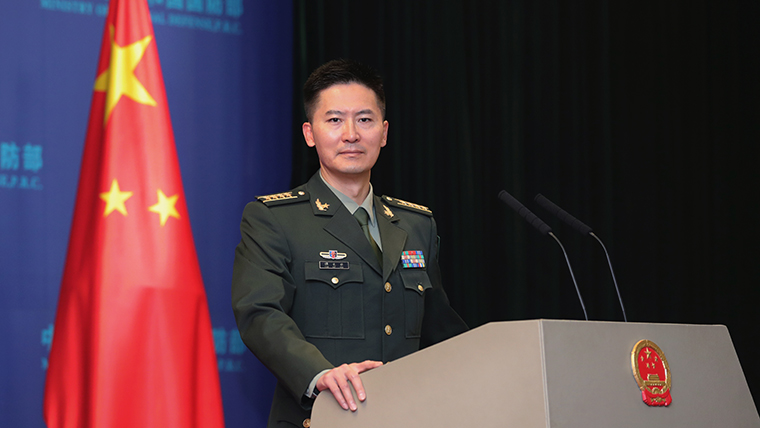
Question:It is reported that the Beijing Xiangshan Forum Webinar 2021 was held in Beijing recently. Experts from all over the world discussed hotspot international security issues, conducted in-depth exchanges and shared their wisdom. Please provide more information about this webinar.
Answer: From October 25th to 26th, the Beijing Xiangshan Forum Webinar 2021 was successfully held in Beijing. More than 50 well-known experts and scholars from over 20 countries and international organizations met via video link. They had discussions and in-depth exchanges under the theme of “Pursue Win-win Cooperation, Advance Global Security Governance”. The webinar achieved the goals of building consensus, enhancing mutual trust and strengthening cooperation.
This year’s webinar has three features. First, the subjects are highly relevant. The webinar include six sessions, namely “major power relations and Asia-Pacific security”, “multilateralism and international system”, “roles of small and middle powers in international security”, “the situation in Afghanistan and its implications for regional security”, “strategic stability: impasse and way out”, and “international security cooperation in the context of COVID-19”. The subjects cover the latest hotspot issues and changes concerning international security. Second, participants are widely representative. Well-known scholars, think-tank experts and former government officials from countries including the US, Russia, India and Vietnam and international organizations including the United Nations and the International Committee of the Red Cross attended the webinar and had open and in-depth exchanges with Chinese experts. Third, many consensuses and outcomes have been achieved. Experts and scholars had heated discussions on a number of important issues. They fully recognized the role and contribution of China and the Chinese military in building a community with a shared future for mankind, promoting international cooperation in the fight against the pandemic and maintaining regional peace and stability.
As President Xi pointed out, plants with strong roots grow well, and efforts with the right focus will ensure success. The Beijing Xiangshan Forum will adhere to the concept of “equality, openness, inclusiveness and mutual learning”, continue to be a high-level cooperation and exchange platform and play an important and active role in helping experts from all parties to discuss security problems, find solutions and promote cooperation.
Question: It is reported that a recently released strategic guidance of the US Navy claimed that “the People’s Liberation Army Navy (PLAN) has radically expanded both its size and capabilities, growing to become the world’s largest fleet”, and that “the People’s Republic of China represents the pacing challenge”. The US Secretary of the Navy stressed to maintain the strength of the US Navy in the future and strengthen its combat readiness. Some analysts believe that this is the first time the US has admitted that American and Chinese navies are already equally powerful. What's your comment on this, please?
Answer: Out of their ulterior motives, some people in the US are trying to exaggerate and hype up the “China military threat” through excessive praise. China is only a pretext for them to expand military power and increase defense spending to maintain global military hegemony. We are firmly opposed to that.
The world has long suffered from hegemony. Backed by its superior military power, the US started wars and caused confrontation and separation many times in disregard of the international law and the basic norms governing international relations. Its hegemonic and bullying acts are evident to the international community. For some time, the US has been wrongfully viewing China as the biggest competitor and a systematic challenge. It has taken the so-called “maximum pressure” approach towards China. Those who are obsessed with winning by force will eventually hurt themselves. This kind of bullying and forceful approach is very risky. It will increase the risk of confrontation between the two countries and the two militaries and threaten regional and world peace and stability. In fact, this approach hurts everyone involved, including the US itself. The recent collision accident involving a US nuclear-powered submarine is a clear proof. We hereby once again urge the US side to take the concerns of other countries seriously, take a responsible attitude, give a detailed explanation on the accident as soon as possible, and provide the international community and regional countries with a satisfactory explanation.
As President Xi said, "Standing at a new historical starting point, China will stay committed to the path of peaceful development and always be a builder of world peace. China will stay committed to the path of reform and opening-up and always be a contributor to global development. China will stay committed to the path of multilateralism and always be a defender of the international order." China firmly upholds a national defense policy that is defensive in nature and will never follow the beaten track of big powers in seeking hegemony. The Chinese military is always a staunch force for maintaining world peace and stability and building a community with a shared future for mankind.
If you stick with the old engine of the Cold War era, you will never catch up with the pace of the new journey for world peace and development. We urge the US side to abandon the outdated Cold War mentality and zero-sum game concept, take a more objective and rational view of China’s defense and military development, and play a constructive role in maintaining international and regional peace and stability.
Question: According to media reports, Japanese Prime Minister Fumio Kishida mentioned during a recent interview that Japan plans to modify its National Security Strategy (NSS) and consider the possibility to develop preemptive attack ability against enemy missile bases. Earlier this month, the Japan Maritime Self-Defense Force (JMSDF) carried out the verification of takeoff and landing of the F-35B aircraft on the helicopter carrier Izumo. What's your comment on this?
Answer: We have noted relevant reports. Japan’s Asian neighbors and the international community are closely following Japan's military and security developments because of historical and realistic reasons. Japan’s attempt to seek military expansion through hyping up the so-called “external threats” is against its commitment to the “exclusively defense-oriented policy”. It is a very wrong and dangerous move. We urge the Japanese side to earnestly reflect on its history of aggression, learn lessons from history, take prudent actions in military and security fields and do more things conducive to promoting regional peace and development.
Question: Recently, Chinese and Russian foreign ministers made a joint statement on strengthening the Biological Weapons Convention (BWC) and pointed out that the lack of transparency of the US biological militarization activities at home and abroad has caused great concerns and queries among the international community. What’s your comment, please?
Answer: Recently, foreign ministers of China and Russia made a joint statement on strengthening the Biological Weapons Convention (BWC). The statement pointed out that the biological militarization activities conducted by the United States and its allies at home and abroad have aroused global concerns and queries on their compliance with the BWC. Those activities also caused serious risks to the national security of China and Russia, and threatened the security of relevant regions.
As everyone knows, the US is the only country blocking the negotiations for a protocol that includes a verification regime to strengthen the BWC. Its bio-militarization activities have aroused great concerns of the international community. Even US media called the Fort Detrick biological base “the center of the US government’s darkest experiment.” Many American people and the international community have long worried that the opaque activities in the base might be illegal and insecure. Lack of transparency of the activities in more than 200 American bio-labs outside the US territory has also caused widespread queries and protests. Moreover, the US has rejected to restart negotiations for the protocol, opposed the establishment of a verification regime and stubbornly stood on the opposite side of the international community in the past two decades, which only caused greater suspicions and concerns of other parties.
Biological militarization activities are crucial issues to international peace, security and national interests of all nations. We urge the US side to adopt an open, transparent and responsible attitude, make a serious response to the concerns of the international community, earnestly fulfill the obligations of a state party to the BWC and make comprehensive clarifications on its bio-militarization activities conducted both at home and abroad.
Question: It is reported that the Democratic Progressive Party (DPP) authorities have repeatedly hyped up Taiwan's military ties with the US, and Taiwan’s so-called “Army Commander” led a delegation to visit the US recently. During the visit, the delegation attended the annual meeting of the Association of the US Army and met representatives from the US defense department and the military. What’s your comment on this, please?
Answer: We have taken note of relevant reports. The Chinese side has expressed our serious concern and lodged solemn representations to the US side and urged the US side to make clarifications. The one-China principle is the political foundation of China-US relations. China strongly opposes any official contacts and military ties between the US and China’s Taiwan region. For some time, some people in the US have been going against the political commitment of one-China and keep playing the “Taiwan card”. These actions have sent extremely wrong signals to the “Taiwan independence” separatist forces and led to significant negative impact on the relations between the two countries and two militaries, as well as peace and stability across the Taiwan Strait. If the US continues to stubbornly hold to the illusion of using Taiwan to contain China, and attempts to substantially improve its military ties with Taiwan with the “salami-slicing” approach, China will resolutely take countermeasures and respond.
The historical task of complete reunification of our country must be and will be realized. Any attempt to obstruct national reunification and rejuvenation by soliciting and depending on foreign support is doomed to failure. The PLA will take all necessary measures to stop the interference by external forces and separatist actions by the “Taiwan independence” forces, and resolutely safeguard national sovereignty and territorial integrity.
